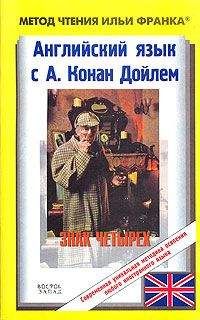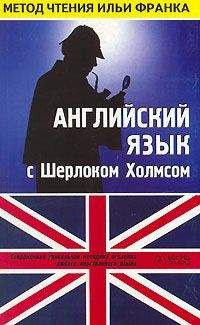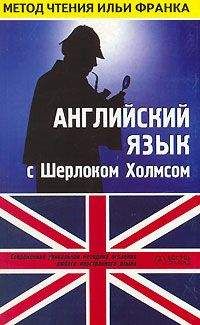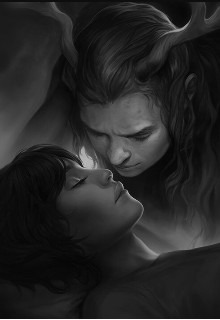Arthur Conan Doyle - Английский язык с Шерлоком Холмсом. Первый сборник рассказов
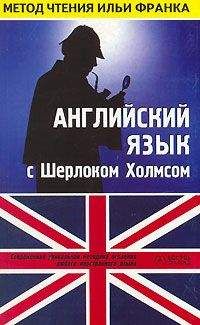
Помощь проекту
Английский язык с Шерлоком Холмсом. Первый сборник рассказов читать книгу онлайн
effusive [ɪˈfju:sɪv], kindly [ˈkaɪndlɪ], singular [ˈsɪŋjulǝ]
His manner was not effusive. It seldom was; but he was glad, I think, to see me. With hardly a word spoken, but with a kindly eye, he waved me to an armchair, threw across his case of cigars, and indicated a spirit case and a gasogene in the corner. Then he stood before the fire and looked me over in his singular introspective fashion.
"Wedlock suits you (брак подходит вам = /идет/ на пользу; to suit — подходить, устраивать)," he remarked (заметил он). "I think, Watson, that you have put on seven and a half pounds (что вы пополнели на семь с половиной фунтов; to put on — надевать, прибавлять) since I saw you (с тех пор как я вас видел /в последний раз/)."
"Seven! (семь)" I answered (ответил).
remark [riˈmɑ:k], pound [ˈpaund], answered [ˈɑ:nsǝd]
"Indeed (в самом деле), I should have thought a little more (следует думать, немного больше). Just a trifle more (чуточку больше; just — только; trifle — мелочь, пустяк), I fancy (предполагаю; to fancy — представлять), Watson. And in practice again (практикуете снова = в практике), I observe (/как/ я вижу; to observe — наблюдать). You did not tell me (вы не говорили мне; to tell — говорить) that you intended to go into harness (что собираетесь впрячься в работу; to intend — намереваться; to go into — впадать; harness — упряжь)."
"Then, how do you know?" (/так/ откуда /же/ вы знаете = как вы знаете)
trifle [traɪfl], harness [ˈhɑ:nɪs]
"Wedlock suits you," he remarked. "I think, Watson, that you have put on seven and a half pounds since I saw you."
"Seven!" I answered.
"Indeed, I should have thought a little more. Just a trifle more, I fancy, Watson. And in practice again, I observe. You did not tell me that you intended to go into harness."
"Then, how do you know?"
"I see it, I deduce it (вывел это = сделал вывод; to deduce — заключить). How do I know that you have been getting yourself very wet lately (откуда я узнал, что вы сильно промокли недавно; to get wet — промокать), and that you have a most clumsy and careless servant girl (и что у вас самая неловкая и небрежная горничная; clumsy — неуклюжий; to care — заботиться; servant — слуга)?"
deduce [dɪˈdju:s], clumsy [ˈklʌmzɪ]
"My dear Holmes (дорогой Холмс)," said I (сказал я), "this is too much (это слишком). You would certainly have been burned (вы были бы наверняка сожжены = вас сожгли бы; to burn — сжигать, сгорать), had you lived a few centuries ago (если бы вы жили несколько веков назад; to live — жить; a few — несколько; century — столетие; ago — тому назад). It is true (/это/ правда) that I had a country walk on Thursday (я был за городом в четверг; country — сельская местность; to walk — ходить) and came home in a dreadful mess (пришел домой в ужасном беспорядке; to come — приходить; dreadful — страшный), but as I have changed my clothes (так как я переменил одежду; to change — менять) I can't imagine (не могу представить; to imagine — воображать) how you deduce it (как вы догадались /об этом/). As to Mary Jane (что касается Мэри Джейн), she is incorrigible (безнадежна), and my wife has given her notice (моя жена дала ей предупреждение = предупредила; to give — давать; notice — извещение, заметка), but there (и все же), again (опять), I fail to see (не понимаю; to fail — потерпеть неудачу) how you work it out (как вы догадались; to work out — определять)."
He chuckled (хихикнул) to himself and rubbed his long, nervous hands together (потер свои длинные нервные руки).
certainly [ˈsǝ:tnlɪ], centuries [ˈsenʧǝrɪ], incorrigible [ɪnˈkɔrɪʤǝbl]
"I see it, I deduce it. How do I know that you have been getting yourself very wet lately, and that you have a most clumsy and careless servant girl?"
"My dear Holmes," said I, "this is too much. You would certainly have been burned, had you lived a few centuries ago. It is true that I had a country walk on Thursday and came home in a dreadful mess, but as I have changed my clothes I can't imagine how you deduce it. As to Mary Jane, she is incorrigible, and my wife has given her notice, but there, again, I fail to see how you work it out."
He chuckled to himself and rubbed his long, nervous hands together.
"It is simplicity itself (проще простого; simplicity — простота)," said he; "my eyes tell me (мои глаза говорят мне) that on the inside of your left shoe (что с внутренней стороны вашего левого ботинка; inside — внутренняя сторона), just where the firelight strikes it (как раз /там/ куда падает свет от огня; to strike — бить; достигать), the leather is scored by six almost parallel cuts (кожа поцарапана = на коже видны шесть почти параллельных царапин; to score — оставлять след; cut — разрез). Obviously (очевидно) they have been caused by someone (были сделаны кем-то; to cause — вызывать, причинять) who has very carelessly scraped round the edges of the sole (кто очень небрежно обтирал края подошвы; to scrape — чистить, скрести; round — вокруг) in order to remove crusted mud from it (чтобы удалить засохшую грязь /с нее/; to remove — снимать; crusted — в виде корки). Hence (отсюда), you see, my double deduction (двойной вывод) that you had been out in vile weather (что вы были снаружи = выходили в мерзкую погоду), and that you had a particularly malignant boot-slitting specimen of the London slavey (и что у вас чрезвычайно зловредный режущий ботинки экземпляр лондонской прислуги; to slit — разрезать вдоль; specimen — образец). As to your practice, if a gentleman walks into my rooms smelling of iodoform (если в мой дом входит джентльмен, пахнущий йодоформом; to smell — пахнуть), with a black mark of nitrate of silver upon his right forefinger (с черной отметкой от азотнокислого серебра на его правом указательном пальце; to mark — ставить знак), and a bulge on the right side of his top-hat (и выпуклостью на правой стороне его цилиндра; top — вершина, hat — шляпа) to show where he has secreted his stethoscope (которая указывает, где он спрятал свой стетоскоп; to show — показывать; to secrete — прятать), I must be dull (я должен быть глупцом; dull — тупой), indeed (в самом деле), if I do not pronounce him to be an active member of the medical profession (если я не признаю в нем деятельного члена медицинской профессии = представителя врачебного мира; to pronounce — объявить)."
simplicity [sɪmˈplɪsɪtɪ], leather [ˈleðǝ], specimen [ˈspesɪmǝn]
"It is simplicity itself," said he; "my eyes tell me that on the inside of your left shoe, just where the firelight strikes it, the leather is scored by six almost parallel cuts. Obviously they have been caused by someone who has very carelessly scraped round the edges of the sole in order to remove crusted mud from it. Hence, you see, my double deduction that you had been out in vile weather, and that you had a particularly malignant boot-slitting specimen of the London slavey. As to your practice, if a gentleman walks into my rooms smelling of iodoform, with a black mark of nitrate of silver upon his right forefinger, and a bulge on the right side of his top-hat to show where he has secreted his stethoscope, I must be dull, indeed, if I do not pronounce him to be an active member of the medical profession."
I could not help laughing at the ease (я не мог удержаться от смеха над простотой; can not help /doing something/ — не мочь не /делать что-то/; ease — легкость) with which he explained (с которой он объяснил; to explain — объяснять) his process of deduction. "When I hear you give your reasons (когда я слышу /как/ вы приводите свои соображения; to give — давать)," I remarked (заметил я; to remark — замечать), "the thing always appears to me to be so ridiculously simple (вещь всегда представляется мне cтоль смехотворно простой = все кажется до смешного простым; to appear — появляться) that I could easily do it myself (что мог бы легко сделать это = сообразить сам), though at each successive instance of your reasoning (хотя в каждом новом случае ваших рассуждений; successive — последующий; instance — пример) I am baffled (я ошеломлен; to baffle — ставить в тупик) until (пока) you explain (не объясните) your process. And yet I believe that my eyes are as good as yours (между тем я думаю, что мои глаза так же хороши, как и ваши = зрение у меня не хуже вашего; to believe — верить, полагать)."
laughing [ˈlɑ:fɪŋ], ridiculously [rɪˈdɪkjulǝslɪ], instance [ˈɪnstǝns]
I could not help laughing at the ease with which he explained his process of deduction. "When I hear you give your reasons," I remarked, "the thing always appears to me to be so ridiculously simple that I could easily do it myself, though at each successive instance of your reasoning I am baffled until you explain your process. And yet I believe that my eyes are as good as yours."
"Quite so (совершенно так)," he answered (ответил он; to answer — отвечать), lighting a cigarette (закуривая папиросу; to light — зажигать), and throwing himself down into an armchair (садясь в кресло: «бросая себя в кресло»; to throw down — бросать). "You see, but you do not observe (вы видите, но не наблюдаете). The distinction is clear (разница ясно видна; clear — чистый, прозрачный). For example (например), you have frequently seen (часто видели) the steps which lead up from the hall to this room (ступени, которые ведут из прихожей в эту комнату; to lead up — вести куда-либо)."
throwing [ˈƟrǝuɪŋ], frequently [ˈfri:kwǝntlɪ], distinction [dɪsˈtɪŋkʃn]
"Frequently (часто)."
"How often? (как часто)"
"Well, some hundreds of times (ну, несколько сотен раз)."
"Quite so," he answered, lighting a cigarette, and throwing himself down into an armchair. "You see, but you do not observe. The distinction is clear. For example, you have frequently seen the steps which lead up from the hall to this room."
"Frequently."
"How often?"
"Well, some hundreds of times."
"Then how many are there (/ну и/ как много = сколько их /там/)?"
"How many? I don't know (не знаю)."
"Quite so (вот-вот = именно так)! You have not observed (вы не наблюдали; to observe — наблюдать). And yet (между тем) you have seen. That is just my point (в этом вся суть, именно это я и хочу сказать). Now, I know that there are seventeen steps (а я знаю, что там семнадцать ступеней), because I have both seen and observed (потому что я и видел, и наблюдал; both — и то, и другое). By the way (кстати), since (поскольку) you are interested in these little problems (интересуетесь этими небольшими проблемами; to be interested in — интересоваться /чем-либо/), and since you are good enough to chronicle one or two of my trifling experiences (достаточно хороши чтобы = были добры описать один-два моих маленьких опыта; to chronicle — заносить в дневник) you may be interested in this (вас может заинтересовать это)." He threw over a sheet of thick, pink-tinted note-paper (бросил лист толстой розовой почтовой бумаги; tinted — окрашенный; note — запись) which had been lying open upon the table (которая лежала: «была лежащей» на столе; to lie — лежать). "It came by the last post (получена с последней почтой = только что)," said he. "Read it aloud (прочитайте /ее/ вслух; to read — читать)."
